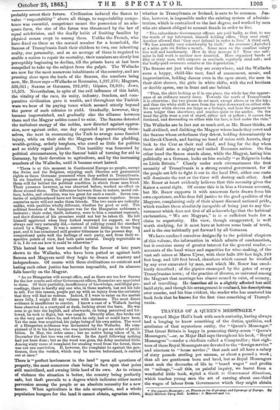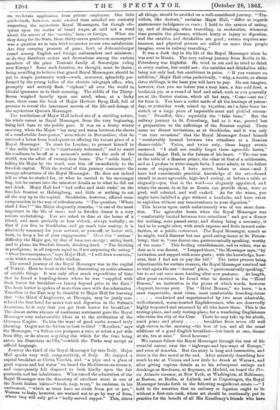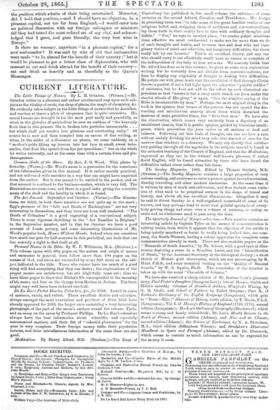TRAVELS OF A QUEEN'S MESSENGER.*
WE opened Major Hall's book with much curiosity, having always. had a longing to know something of the duties, qualities, and attributes of that mysterious entity, the "Queen's Messenger.' That Great Britain is happy in possessing thirty-seven "Queen's Messengers,"—or, as Major Hall says throughout his book, "Royal Messengers "—under a chieftain called a Comptroller ; that eigh- teen of these Royal Messengers are devoted to the "foreign service and nineteen to "house service ;" that each and all have a salary of sixty pounds sterling per annum, or about a pound a week ; that all are gentlemen born and bred, but as Royal Messengers must seek the decencies of life in "board wages" and profits. on "mileage,"—all this, on painful inquiry, we learnt from a. wonderful little book, styled a Guide to Government Situations-, which teaches young men the art of earning about one-third the wages of labour from Government which they might obtain • The Queen's Messenger or, f'ravett oaths High-soap and Bye-ways of' Europe. By Major Herbert Byog Hell. Landon : J. Maxwell and Co.
on moderate application from private employers. Our little guile-book, however, more excited than satisfied our curiosity respecting the mysterious Royal Messengers, for though elo- quent upon the matter of board wages, at said not a word about the nature of the "service," home or foreign. What are they doing for the State, these thirty-seven gentlemen messengers? was a question we in vain tried to answer to our own satisfaction. Are they carrying presents of game, fowl, or Johannisberger round among English and foreign ambassadors and ministers ; or do they distribute orders and decorations among the various members of the great Teutonic family of Sovereigns ruling over Europe? Some such function, we thought, must be theirs ; being unwilling to believe that grand Royal Messengers should be put to simple postman's work—work, moreover, splendidly per- formed by the young ladies of the electric telegraph office, who, promptly and secretly flash " ciphers " all over the world in blissful ignorance as to their meaning. The riddle of the Thirty- Seven weighed heavily upon our mind, when, at a lucky hour, there came the book of Major Herbert Byng Hall, full of promise to reveal the innermost secrets of the life and doings of the mysterious Queen's Messenger.
The revelations of Major Hall indeed are of a startling nature, his whole career as Royal Messenger, from the very beginning, being laid bare to the public gaze. It was on a frosty winter morning, when the Major "lay snug and warm between the sheets of a comfortable four-poster," somewhere in Devonshire, that he received a letter from head-quarters offering the vacant. place of a Royal Messenger. To start for London ; to present himself to "the noble head ;" to be "courteously welcomed ;" and to assert his readiness to be off at a moment's notice to the ends of the world, was the affair of twenty-four hours. The "noble head," taking his Major by the word, sent him off immediately to the Swedish capital. With the recital of this journey commence the strange adventures of the Royal Messenger. He does not indeed tell us what he started for, or what he carried in his messenger bag, but he enters into the minutest details as to what he did eat and drink. Major Hall had "bad coffee and stale rusks" on the Swedish frontier at lieLsingborg, and little or nothing to eat all the way up to the capital. Stockholm, however, offered some compensation in the way of refreshments. "The question, 'Where shall I dine?'" the Major eloquently remarks, "is one of the most important in the life of man ; and in Sweden dinner is a very serious undertaking. You are asked to dine at the house of a friend, and most probably at four o'clock, always verbally; so that if you live in Stockholm, and go much into society, it is absolutely necessary for your servant, or yourself, or better still, both, to keep a list of your engagements." Over this " serious " difficulty the Major got, by dint of immense energy ; eating hard, and to please his Swedish friends, drinking hard. "The drinking is prodigious ; in all respects equal to, if not surpassing the eating " "Over its consequences," says Major Hall, ".1 will draw a curtain," —in which remark there lurks wisdom.
The second journey of the Royal Messenger was to the capital of Turkey. Here he went to the bad, discovering an entire absence of eatable things. It was only after much expenditure of time th it he found a boarding-house where he was "supplied with fresh butter for breakfast—a luxury beyond price in the East." The fresh butter is spoken of more than once with due admiration Travellers to the East may be thankful to Major Hall for learning that "the Hotel cl'Ingleterre, at Therapia, may be justly con- sidered the best hotel for man's rest and digestion in the Sultan's dominions, be it only that you get fresh butter for breakfast." The almost entire absence of toothsome nutriment gave the Royal Messenger very unfavourable ideas as to the civilization of the Ottoman Empire. To him the want of good cooks seemed truly alarming. Ought not the Sultan to look to this? "Recollect," says the Messenger, "a Sultan can postpone a race, or select a pet wife from fifty, or do almost aaything else which for the time being enters his illustrious no lile,"—which the Turks may accept as official language.
Journey the third of the Royal Messenger lay into Italy. Major Hall speaks very well, comparatively, of Italy. Ha enjoyed a capital breakfast at Civita Vecchia, and "a pipe and a glass of good cognac and hot water" on board the Mediterranean steamer, and consequently felt disposed to look kindly upon the fair peninsula and her inhabitants. What raised the admiration of the Royal Messenger was the discovery of excellent trout in one of the North Italian lakes—" fresh, rosy, trout," he exclaims, in his excitement, "which as trout have no rivals from pot or pan." Visitors to Italy, however, are warned not to go by way of Susa, where they will only get a "badly-served supper." This, above all things, should be avoided on a well-considered journey. "Tra- vellers, like doctors," exclaims Major Hall, "differ as regards gastronomic indulgence en route; I hold to the system of eating, ay, and of drinking, when travelling, in moderation, whenever time permits the pleasure, without hurry or injury to digestion, and the eatables and drinkables are good ; nature requires sus- tenance, and physical powers are called on more than people imagine, even in railway travelling."
It was a dark day in the life of the Royal Messenger when he was sent to Russia. The -very railway journey from Berlin to St.
Petersburg was frightful. He tried to eat and he tried to drink at every station, but could not : the eatables and drinkables alike being not only bad, but exorbitant in price. If you venture on solidities," Major Hall cries pathetically, "why, a rouble, or about three shillings, is the least you will have to pay. Do not imagine, however, that you see before you a rosy ham, a fine cold fowl, a beefsteak pie, or a round of beef and salad, such as you generally see at the Exeter station, which all but says, Come —eat me ;' far from it. You have a cutlet made of all the leavings of yester-
day, or yesterday week, mixed up together, and a false bone in- serted, or a large piece of impossible meat and pickled cucum- bers." Dreadful, this ; especially the "false bone." But the railway journey to St. Petersburg, bad as it was, proved but a preparation to the sufferings of the Russian capital. There came no dinner invitations, as at Stockholm, and it was only "on rare occasions" that the Royal Messenger found himself "comfortably located between two crinolines at a Russian
dinner-table." Twice, and twice only, these happy events occurred. "I shall not readily forget those agreeable hours," exclaims Major Hall, in the fulness of his heart. "The one was at the table of a Russian prince, the other at that of a millionaire, and as I profess to write simple facts, I must admit, in the fullest sense of enjoyment, I have never, before or since—and I have had considerable practical knowledge of the art—found myself in more agreeable, high-bred society, or before a table so elegantly—yes, that is the word—so elegantly appointed, ant where the meats, in so far as Russia can provide them, were so good, well selected, and well cooked. As for the wines, you might have imbibed a pipe without a headache, and have eaten to repletion without any inconvenience to your digestion."
This heaven upon earth unfortunately was of too short dura- tion. The agreeable hours when the Royal Messenger was "comfortably located between two crinolines" and got a dinner for nothing, soon passed away, and dining being a necessity, it had to be sought after, with much expense and little inward satis- faction, at a public restaurant. The Royal Messenger, search as he might, could discover but one good eating-house at St. Peters- burg ; that is, "one decent one, gastronomically speaking, worthy of the name." This feeding establishment, sad to relate, was as dear as it was decent. " I supped there," the Messenger says, "trir invitation, and supped with some gusto ; with the knowledge, how- ever, that I had not to pay the bill." The latter process being objectionable for certain reasons, the Royal Messenger resolved not to visit again the one "decent" place, "gastronomically speaking," but to set out once more hunting after new pastures. At length, after great exertions, he found what he desired in the "Hotel Benson," an institution in the praise of which words, however eloquent, become poor. The " HOtel Benson," we learn, "is a most respectable, most clean, most comfortable boarding-house . . . • conducted and superintended by two most admirable, well-educated, warm-hearted Englishwomen, who are deservedly highly respected and esteemed by all who know them. This is the resting-place, and only resting-place, for a wandering Englishman who visits the city of the Czar. There he may take up his abode,
amid peace and plenty breakfast from seven till well nigh eleven in the morning —the best of tea, and all the usual additions of a good English breakfast—hot lunch at one, dinner . at six, tea at nine." Good heavens !
We cannot follow the Royal Messenger through the rest of his eventful career, over the "highways and bye-ways of Europe," and even of America. But the story is long and instructive, and there is the due moral at the end. After minutely describing how much he ate at Vienna and how little he drank at Warsaw, and after giving copious details as to his subsequent e,atings and drinkings at Bordeaux, at Bayonne, at Madrid, on board the Per- sia Atlantic steamer, at New York, at Washington, at Baltimore, at Boston, at Berlin, at Lubeck, and at Copenhagen, the Royal Messenger breaks forth in the following magnificent strain :—" hold to the assertion that no embassy or legation ought to be without a first-rate cook, whose art should be continually put in practice for the benefit of all His Excellency's friends who have the position which admits of their being entertained. Moreover, did I hold that position,—and I should have no objection, in a pleasant capital, not too far from England, —I would enter into no political discussion with my foreign colleagues or ministers till they had tested the most refined art of my chef, mad acknow- ledged that I gave, and gave liberally, the very best wine in Europe."
Is there no vacancy, anywhere "in a pleasant capital," for a new ambassador ? It was said by wits of old that ambassadors were made "to lie abroad for the benefit of their country ;" but it would be pleasant to get a better class of diplomatists, who will consent to eat and drink abroad for the benefit of their country— eat and drink as heartily and as cheerfully as the Queen's Messenger.
































 Previous page
Previous page